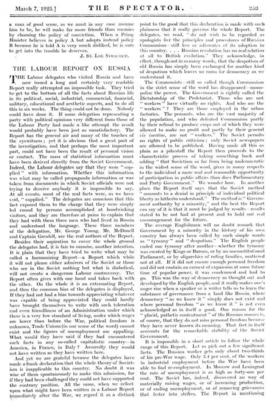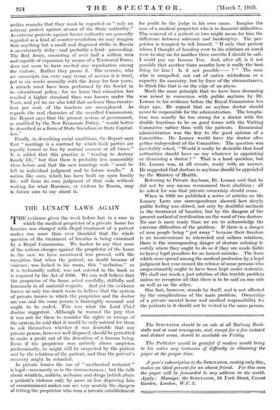THE LABOUR REPORT ON RUSSIA
THE Labour delegates who visited Russia and have now issued a long and certainly very readable Report really attempted an impossible task. They tried to get to the bottom of all the facts about Russian life in its political, social, industrial, commercial; financial, military, educational and aesthetic aspects, and to do all this in six weeks. The thing could not be done. Nobody could have done it. If some delegation representing a party with political opinions very different from those of the Labour Party had made a like attempt the result would probably have been just as unsatisfactory. The Report has the general air and many of the touches of the eyewitness ; yet it is -obvious that a great part of the investigation, and that perhaps the most important part, could not have been the result of personal vision or _ contact. The mass of statistical information must have been derived directly from the Soviet Government. Indeed, the Labour delegates say that they were "sup- plied" with information. Whether this information was what may be called propaganda information or was taken from documents in which Soviet officials were not trying to deceive anybody it is impossible to say. At all events, most of the real facts were, as we have slid, " supplied." The delegates are conscious that this fact exposed them to the charge that they were simply led round by persons accomplished at hoodwinking visitors, and they are therefore at pains to explain that they had with them three men who had lived in Russia and understood the language. These three members of the delegation, Mr. George Young, Mr. McDonell and Captain Grenfell, are the real authors of the Report.
Besides. their aspiration to cover the whole ground the delegates had, it is fair to surmise, another intention. It is plain that they have tried to write what may be called a harmonizing Report—a Report which while it will not please either admirers of the Soviet or those who see in the Soviet nothing but what is diabolical, will not create a dangerous Labour controversy. The Report often gives with one hand and takes back with the other. On the whole it is an extenuating Report, and thus the common bias of the delegates is displayed. If they had not had a bias towards appreciating whatever was capable of being appreciated they could hardly have brought themselves to write with such toleration and even friendliness of an Administration under which. there is a very low standard of living, under which wages are lower than before the War, political freedom is unknown, Trade Unions (in our sense of the word) cannot exist and the figures of unemployment are appalling. What would they have said if they had encountered such facts in any so-called capitalistic country—in America, in France, in Italy ? Assuredly. they would not have written as they have written here.
And yet we are grateful because the delegates have made a frank declaration that the whole theory of Soviet-- ism is inapplicable to this country. No doubt it was wise of them spontaneously to make this admission, for if they had been challenged they could not have supported the contrary position. All the same, when we -reflect upon what might have been written in a Labour Report immediately after the War, we regard it as a distinct point to the good that this declaration is made with such plainness that it really governs the whole Report. The delegates, we read, " do not wish to be regarded as apologists fo r the principles and procedures of Russian Communism---still less as advocates of its adoption in 1 his country. . . . Russian revolution has no real relation at all to British evolution." They acknowledge, in effect, though not in so many words, that the despotism of old Russia has simply been exchanged for another kind of despotism which leaves no room for democracy as we understand it.
The Communists—still so called though Communism in the strict sense of the word has disappeared—mono- polize the power. The Government is rightly called the Dictatorship of the Proletariat. Those who are not " workers " have virtually no rights. And who are the " workers " ? They are those employed un the urban factories. The peasants, who arc the vast majority of the population, and who defeated Communism partly by their refusal to produce crops out of which they were allowed to make no profit and partly by their general, ris inertiae, are not " workers." The Soviet permits no rights of public criticism ; only Soviet newspapers are allowed to be published. Having made all this as plain as a pikestaff the Report then proceeds to the characteristic process of taking something back and adding " that Sovietism so far from being undemocratic in the widest sense of the word, gives in many respects to the individual a more real and reasonable opportunity or participation in public affairs than does Parliamentary and Party Government." We wonder how. In another place the Report itself says that the Soviet method " amounts to a denial in principle of individual political liberty as hitherto understood." The method is " Govern- ment authority by a minority," and the best the Report can say of it is that it must be judged by results—results stated to be not bad at present and to hold out real encouragement for the future.
The average Englishman will no doubt remark that Government by a minority in the history of his own country has always been called by such simple words as " tyranny " and " despotism." The English people ended one tyranny after another—whether the tyranny was created by Kings or Barons, or by an unconstitutional Parliament, or by oligarchies of ruling families, mattered not at all. If it did not ensure enough personal freedom and did not contain an earnest of expansion at some future time of popular power, it was condemned and had to go. This was the way of democracy as thought out and developed by the English people, and it really makes one's anger rise When a speaker or a writer tells us to learn the substance of governance from a land like Russia, where democracy " as we know it " simply does not exist and where personal freedom " as we know it " is not even acknowledged as in itself a good. One reason for the " placid, pathetic contentment " of the Russian masses is, of course, that they do not miss personal freedom because they have never known its meaning. That fact in itself accounts for the remarkable stability of the Soviet Government.
It is impossible in a short article to follow the whole range of this Report. Let us pick out a few significant facts. The Russian worker gets only about two-thirds of his pre-War wage. Only 5.4 per cent. of the workers in industrial employment before the War have been able to find re-employment. In Moscow and Leningrad the rate of unemployment is as high as forty-one per cent. The Soviet has, indeed, discovered no way of materially raising wages, or of increasing production, Or of ending unemployment, or of removing grievances that fester into strikes. The Report in mentioning strikes remarks that they must be regarded as " only an extreme protest against abuses of the State authority." As extreme protests against Soviet authority are- generally regarded as a kind of counter-revolution we may imagine that anything but a small and disguised strike in Russia is an extremely risky—and probably a fatal—proceeding. The Red Army, . consisting of over half a million men and capable of expansion by means of-a Territorial Force, does not seem to have excited any reprobation among the visitors. Rather they praise it. The recruits; who arc conscripts (on very easy terms of service it is true); put in six weeks annually with the Army for four years: A miracle must have, been performed by the Soviet- in its educational policy,, for we learn that' education has reached a higher standard than was known under the Tsars, and yet we are also told' that no fewer than twenty- four per cent. of the teachers are unemployed. As regards the real character of the so-called Communism-, the Report says. that the present system of- government; as modified. by the New Economic Policy, " would better be described as a form of. State Socialism or State' Capital, ism."
Finally, in describing social conditions, the Report says that " marriage is a contract by which both parties are equally bound Or free by mutual consent at all times." It is added that this practice is " tending to destroy family life," but that there is probably less immorality than before and that the new marriage code " must be left to individual judgment and to future results." A nation like ours, which has been built up upon family life, will form its own judgment of that code without waiting for what Russians, or visitors to Russia, may in future care to say about it.



























































 Previous page
Previous page